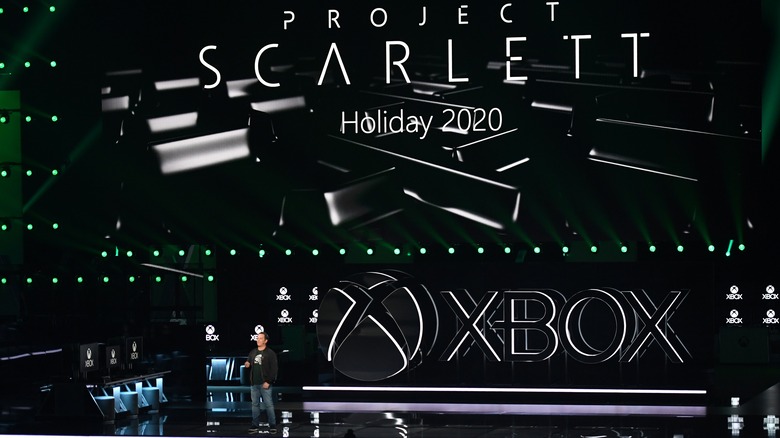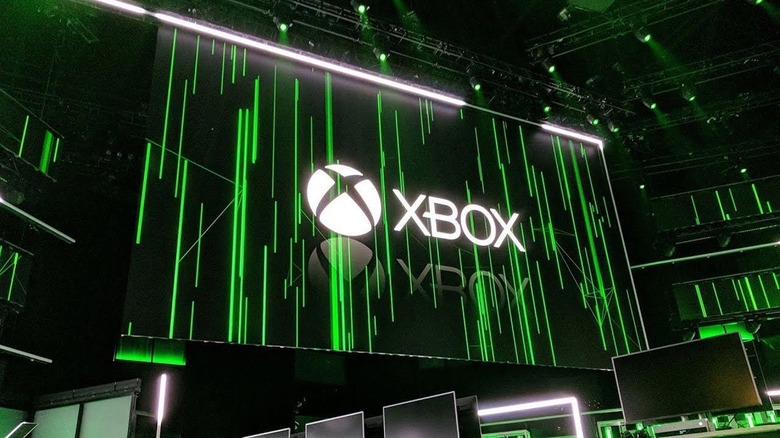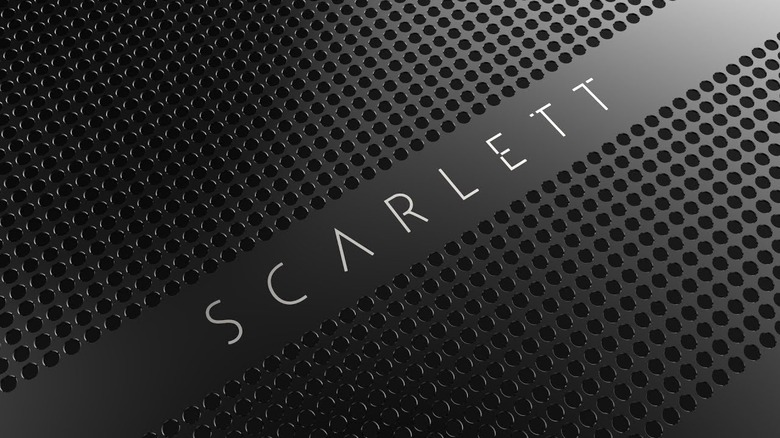Good News Leaked For Xbox Scarlett Fans
We don't know a whole lot about Xbox Scarlett, aside from what Microsoft's chosen to tell us. A recent report, however, suggests that Microsoft's next-generation console could be quite the powerhouse, and that's great news for anyone who might have been concerned about the types of experiences Scarlett could provide.
Windows Central gets the hat tip here, as the outlet heard from sources that "Anaconda" – the internal codename for the machine — is primed to deliver the kind of power we haven't seen before in a console. While the Xbox One S packs 1.4 teraflops of computing muscle, and the the Xbox One X ups that to 6 teraflops, the Anaconda version of Xbox Scarlett will reportedly come in at 12 teraflops, making the machine twice as powerful as the One X. That's pretty incredible.
But that's not all.
Rumor has it that both Anaconda and Lockhart — the lower-tier console Microsoft is still apparently making — will come decked out with eight CPU cores that Microsoft hopes will reach a clock speed of 3.5GHz. Windows Central states that, when all is said and done, Anaconda could "perform anywhere up to four to five times better than the Xbox One X, if targets are met." And when you add in the news that Xbox Scarlett could also come with 16 GB of RAM — 3 GB for its operating system and 13 GB for games — you can start to get a sense of how much power Microsoft is trying to stuff under the hood.
The Anaconda version of Xbox Scarlett does not sound like a toy, based on these specs. It sounds like the kind of system that could play very good-looking games in 4K at 60 frames-per-second for years to come.
What is this Lockhart business?
The word on the street is that Microsoft wants to usher everyone into the next generation, even if some can't afford Microsoft's more powerful console. So the company is reportedly working on two different systems that'll sail under the Scarlett flag: Anaconda and Lockhart.
It might help to think of Anaconda and Lockhart as two different types of iPads. Anaconda is essentially the iPad Pro; the top-of-the-line Apple tablet that comes with the latest, greatest hardware and supports all of the latest iPadOS features. Lockhart is, for all intents and purposes, the entry-level iPad. It still supports many features of iPadOS, and though it'll never perform like an iPad Pro, it can still do a lot of the same things.
Lockhart, according to Windows Central, will offer less raw computing power than both Anaconda and the Xbox One X. But it'll make up for that with improvements in other key areas. We already spoke about how Lockhart will get a bump in CPU clock speed, which could help games hit higher frame rates. And it's even said that Lockhart will include an NVMe solid state drive for storage, doing away with the long load times we've become so used to with current-gen machines.
It'll be interesting to see where Lockhart is priced in relation to Anaconda, and what Microsoft ultimately decides to do with the Xbox One S and Xbox One X. We speculated in the past that Microsoft might keep the One X around as the new "entry-level" console, giving players a taste of 4K before they ultimately move up to the beefier Xbox Scarlett. But it sounds like Lockhart is going to fill that role, so we could end up seeing Microsoft phase out its last-gen systems as we get further into 2021.
When might we see Anaconda and Lockhart?
We're about a year out from the launch of Xbox Scarlett, and already, fans are wondering when we might get a look at Microsoft's next-gen hardware. Microsoft used E3 to both announce the existence of Project Scorpio and, later, unveil what would ultimately be called the Xbox One X. And Microsoft did the same for Xbox Scarlett, making that console known to the world at E3 2019.
Except now there are two consoles, apparently: Anaconda and Lockhart. So when might we see them?
If we had to guess, we'd say Microsoft is going to stick to the script and pull the curtain back on both consoles at E3 2020. The last time Microsoft held a console reveal event outside of E3 — back when it first introduced the Xbox One — things didn't go so well. Microsoft has put together a string of great shows at E3 over the past few years, so there's really no reason for the company to disrupt that mojo. It'll have a stage all to itself in front of Xbox fans and press, and it'll likely have a prime spot in the E3 schedule. Why complicate things by holding a separate event?
Anyway, that's our prediction. We'll certainly find out for sure as we make our way through the early stages of 2020. Should we hear more news about Xbox Scarlett's Anaconda and Lockhart consoles, we'll keep you in the loop.



